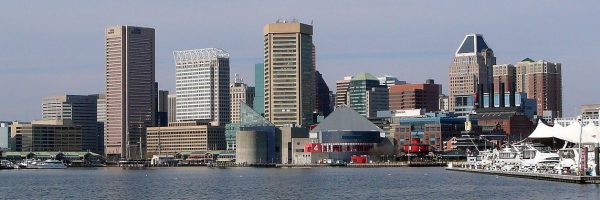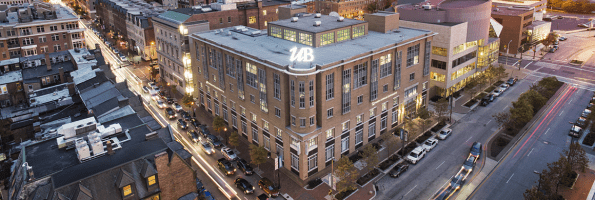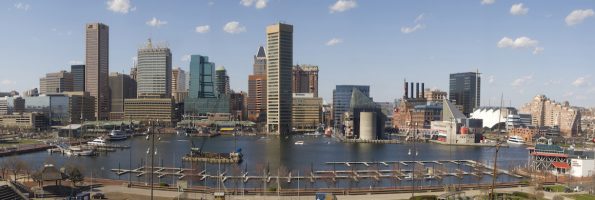How Affordable are Baltimore MBA Programs Compared to DC?

A few years ago, the Baltimore Sun published a hilarious list outlining 100 reasons why Baltimore is a better city than Washington DC. Here are some of our favorite reasons:
- We don’t start conversations by asking, “What do you do?” or “Who do you work for.”
- It never takes us 45 minutes to go six miles.
- Our traffic doesn’t lead to clinical depression.
- D.C.’s happy hour is regular price to us.
- Our signature food is crab cakes and pit beef. D.C. has … yeah.
- We weren’t built on a swamp.
- Cal Ripken is 2,632 times better than any D.C. sports figure.
- The NATIONAL Aquarium: Not in the nation’s capital.
Yes, some of these reasons are very tongue-in-cheek, and the list aimed to be light-hearted and irreverent. But if you’re a prospective MBA in the DMV, there are some clear advantages to picking a business school in the Baltimore metro over the Washington DC metro, namely the affordability of programs.
Let’s take a deeper dive and see just how affordable Baltimore MBA Programs are compared to their DC counterparts.
Which MBAs Can You Earn in Baltimore and DC?
Both Baltimore and Washington DC are home to some of the country’s most prestigious business schools and MBA programs. Programs offered in the Baltimore metro include:
- Perdue School of Business – Salisbury University
- Carey Business School – Johns Hopkins University
- Sellinger School of Business – Loyola University Maryland
- University of Baltimore – Merrick School of Business
- University of Maryland R.H. Smith School of Business
Meanwhile, MBA programs offered in the Washington DC Metro include:
- George Mason University School of Business
- George Washington University School of Business
- Howard University School of Business
- Kogod School of Business – American University
- McDonough School of Business – Georgetown University
How Affordable are Baltimore’s Programs Compared to DC’s?
Yes, both metros boast and impressive programs that are sure to provide prospective MBAs with a high-quality business educations, but which city offers the more affordable options?
Here is the average cost per credit hour at business schools in Baltimore.
- Carey Business School Global MBA: $2,174 per credit hour
- Perdue School of Business Full-Time MBA: $392 per credit hour (in-state students), $703 per credit hour (out-of-state students)
- Sellinger School of Business Full-Time MBA: $1,238 per credit hour
- Merrick School of Business Flexible MBA: $824 per credit hour (in-state students), $1,149 per credit (out-of-state students)
- R.H. Smith School of Business Full-Time MBA: $1,658 per credit hour (in-state students), $1,998 per credit (out-of-state students)
Let’s compare these tuitions rates to the MBA offerings in the Washington DC area:
- George Mason University School of Business Full-Time MBA: $950 per credit hour (residents of Virginia, Maryland, and Washington DC), $1,751.50 per credit hour (out-of-state and international students)
- George Washington University School of Business Global MBA: $1,837 per credit hour
- Howard University School of Business Full-Time MBA: $1,259 per credit hour
- Kogod School of Business Full-Time MBA: $1,642 per credit hour
- McDonough School of Business Full-Time MBA: $1,880 per credit hour
When looking at tuition costs, Baltimore takes the cake. Even though Baltimore boasts the most expensive full-time program (Carey Business School Global MBA), the average cost per credit hour for both in-state and out-of-state students is about 16 percent lower in Charm City.
Washington DC vs. Baltimore MBA Cost
| Baltimore | Washington DC | |
|---|---|---|
| In-State Cost (per credit hour) | $1,257.20 | $1,513.60 |
| Out-of-State Cost (per credit hour) | $1,452.40 | $1,673.90 |
Additional Costs To Consider
Aside from tuition, business students living in the Baltimore area have a lower cost of living then their Washington DC counterparts. According to Numbeo, you would need around $4,541 in Baltimore to maintain the same standard of life that you can have with $6,100 in Washington DC, assuming you rent in both cities. This calculation uses the website’s Cost of Living Plus Rent Index to compare cost of living.
Here’s a closer look at how Numbeo creates its Cost of Living Indexes, and a breakdown of a few key stats to look at when comparing Baltimore to Washington DC:
- Consumer Prices in Baltimore, MD are 14.78 percent lower than in Washington DC
- Rent Prices in Baltimore, MD are 39.97 percent lower than in Washington DC
- Groceries Prices in Baltimore, MD are 15.70 percent lower than in Washington DC
- Local Purchasing Power in Baltimore, MD is 10.21 percent lower than in Washington DC
The case for Washington DC
So Baltimore’s MBA offerings are, on average, more affordable than Washington DCs. But what if money isn’t an issue, or you happen to get into a program in DC? Here are a few ways that the Capital City has the Monument CIty beat, according to Thrillist:
- Culinary Scene: DC is experience a craft beer renaissance with four breweries opening in recent years: DC Brau, 3 Stars Brewing, Chocolate City, and Bluejacket (soon). Meanwhile, notable restaurants such as minibar (Andres), Le Diplomate (Starr), Kapnos (Isabella), Range (Voltaggio), and Casa Luca (Trabocchi) have also opened. Baltimore isn’t really known as much of a foodie town.
- Public Transit: The Metro is one of the most efficient, most convenient, and cleanest public rail lines in the country. Baltimore’s metro runs East to West only, and doesn’t link up with either of the two other rail systems.
Oh, and remember that Baltimore Sun article we reference at the top of the page? Enjoy DC Inno’s slightly more punchy response.
What are the Best Marketing MBA Programs in Baltimore?

The Baltimore metro is home to over 2.7 million people, making it the 20th largest metropolitan area in the United States and the economic center of the state of Maryland. Best known for its top colleges and universities, hospitals, sports, and professional and financial services, Baltimore is also a popular meeting and convention destination, according to Visit Baltimore. Continue reading…
Merrick School of Business Professor Named to Baltimore Public Markets Board

Baltimore’s fresh food providers will now have a new face sitting on their board. According to a recent press release, Baltimore Mayor Catherine E. Pugh has named J.C. Weiss, a Senior Lecturer and Executive in Residence for Finance at the Merrick School of Business, to the Board of Directors for both Lexington Market and the Baltimore Public Markets Corporation (BPMC). Continue reading…
The Best of Baltimore’s Part-Time MBA Programs

Committing to graduate school can be both exciting and daunting. Earning an MBA gives aspiring industry leaders an undeniable competitive edge, but going back to school full-time can bring other areas of students’ lives to a screeching halt.
Fortunately, many schools offer part-time MBA programs that allow the flexibility to maintain their career and family commitments while still continuing education. Choosing a program that is the right fit is essential to success. That’s why we put together a rundown of the best part-time MBA programs in Baltimore metro.
Carey Business School — Johns Hopkins
The Carey Business School at Johns Hopkins recently expanded its Flexible MBA track to include more online opportunities. Students opting for the Flexible MBA generally complete their 54 credits over the course of three years. An online or online-on-campus hybrid format for students with concentrations in Leading Organizations, Financial Businesses, or Health Care Management. Students pursuing the on-campus option enroll in eight-week sessions that take place Monday through Thursday from 6-9 p.m. in the evening. Carey offers classes on both the Baltimore and Washington DC campuses. Graduates of the Flexible MBA have gone on to hold powerful positions in companies like AT&T, UBS, and World Bank.
Perdue School of Business — Salisbury University
At the Salisbury Perdue School of Business, students can complete their part-time MBA in two years. Perdue offers a 100 percent online program as well as an online-on-campus hybrid. This MBA curriculum includes access to the SAP University Alliance Program, a global network that allows students and faculty to integrate SAP technologies and resources into the classroom. Gaining this technological know-how may give graduates an immediate edge in the marketplace. The program is excellent for students looking to completely shift trades, or aspiring to pursue the business side of an ostensibly unrelated area. Perdue’s MBA does not require that applicants have an undergraduate degree in a business-related field. In fact, Perdue has embraced students with undergraduate degrees in fields like archaeology and art history.
Sellinger School of Business — Loyola University Maryland
The part-time MBA at Sellinger School of Business is designed for students already balancing full jobs. Business school students on this track take their classes in the evenings, after the work-day is finished. Selling offers hybrid and online options for those who cannot consistently make it to campus for their classes. This program is ideal for students who would like to begin their business education on their own time frame, as applicants can enroll at the beginning of any term. Sellinger boasts an emphasis on “reflections, discernment and ethical commitment,” that distinguishes the program from many others.
Merrick School of Business—University of Baltimore
The Merrick School of Business Flexible MBA upholds University of Baltimore’s emphasis on offering programs that let students continue their educations without putting their lives on hold. All of the classes in this program take place in the evening, and 50 percent of the course are offered online. Courses are offered in seven-week terms. Students in this program set their own pace, and those in different time zones are not at a disadvantage, as online courses are offered in an asynchronous format. Students in the Flexible MBA can choose a full-time or part-time course load, without notifying anyone or navigating any administrative channels.
University of Maryland R.H. Smith School of Business
Students earning their MBA through the R.H. Smith School of Business at the University of Maryland’s part-time program have the benefit of an extremely flexible pace. MBAs can finish their degree in 24 months, 28 months or they can set their own speed and take up to five years. Smith might appeal to those who wish to learn more about the international marketplace, as this MBA program integrates global experiences into the curriculum. Students can choose to attend classes on University of Maryland’s Baltimore, Washington DC, or Rockville/Shady Grove campus. This program was ranked among U.S. News & World Report’s “Best Part-time MBAs.”
Merrick School of Business Appoints New Assistant Dean

The University of Baltimore’s Merrick School of Business has officially announced the appointment of Kathea J. Smith as the new Assistant Dean for Enrollment, Academic Affairs and Student Services. Prior to taking the job, Smith was the director of admissions and recruitment at the Welch Center for Graduate and Professional Studies at Goucher College.
No GMAT or GRE Required: Baltimore

While the GMAT and GRE are still formally normal when it comes to MBA admissions, it’s not a given any more.
